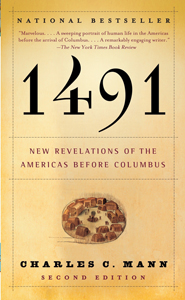 Charles C. Mann, 1491: New Revelations About the Americas Before Columbus (New York: 2005), 541pp.
Charles C. Mann, 1491: New Revelations About the Americas Before Columbus (New York: 2005), 541pp.
What was the world really like that Christopher Columbus encountered when he landed on an island in the Bahamas on October 12, 1492? Exactly who were the "first Americans?" The most popular, the most powerful, and the most misleading stereotype is that he discovered a sort of timeless and unspoiled Eden, and a people who lived, as it were, outside of history. In this view, the Indians "were suspended in time, touching nothing and untouched themselves, like ghostly presences on the landscape."
To take just one example, in 1580 Michel de Montaigne described the peoples of the Amazon as having had "no knowledge of numbers, no terms for governor or political superior, no practice of subordination or of riches or of poverty… no clothing, no agriculture, no metals." They lived, he said, "without toil or travail," in a "bounteous" forest that "furnishes them abundantly with all they need… They are still in that blessed state of desiring nothing beyond what is ordained by their natural necessities: for them anything further is superfluous."
Charles Mann's award-winning book offers a radical challenge to these conventional ideas. He deconstructs the many myths about the ignorant, uncivilized, noble or vicious savages. The so-called "New World" that Columbus encountered turns out to be very old, densely populated, and highly advanced. The Western Hemisphere before 1492 exhibited a "staggering diversity" of societies, a "tumult of languages [about 1200 of them], trade, and culture, a region where tens of millions of people loved and hated and worshipped as people everywhere do." Witness their art, architecture, sophisticated irrigation projects, genetic engineering of maize, and slash-n-burn forest management. These Indian societies—the Incas ("biggest empire on earth" at its heyday), the Maya, the Aztecs (Mexico as "the center of the world"), the Amazonians, etc., were much "older, grander, and complex" than was first imagined.
Mann writes with an encyclopedic knowledge of the emerging scholarship on these subjects. He incorporates the latest findings from history, archaeology, anthropology, molecular biology, church archives, ethnography, genetics, geology, linguistics, and more. He writes with the care of a scholar, acknowledging that the questions surrounding these subjects are complex, controversial, at times speculative, and often disputed. He lets everyone have their say, and allows his readers to draw their own conclusions. He also writes with the literary flair of a fantastic journalist-story teller. I could not put this book down, and count it as one of the most fascinating reads in the last five years.
For more on this subject, see Mann's sequel to 1491, called 1493: Uncovering the New World Columbus Created (2011).
Dan Clendenin: dan@journeywithjesus.net


